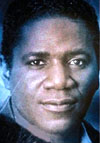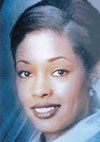I'm often critical of the story that first introduces a new actor into the lead role on Doctor Who, since the writing of those stories often seems to magnify the trauma of the biological process and give too much screen time to abnormal character moments, and often only in subsequent stories does the actor playing the new Doctor demonstrate who he really is and return to the archetypal strengths that make the character succeed. Surprisingly here on "Sliders", the reverse seemed to happen. Though later stories can be criticized for not delivering Quinn Mallory's archetypal lead character strengths, "The Unstuck Man" makes an inspired effort and works remarkably well in nailing Quinn's character successfully, as well as being one of the knock-out stories of the fifth season.
Then we actually have a fully-developed scene in the vortex during the traverse, featuring our characters composited in from a blue-screen shoot, on top of the best vortex background the show ever had. Earlier seasons of "Sliders" can eat their heart out; this version of the effect is the best ever. My least favourite scene of the story is the one where Rembrandt and Maggie meet the new Mallory near the water's edge, as the level of antagonism in their dialogue seems unwarranted and isn't very interesting, perhaps suffering from the old problem of letting your protagonists fall too far behind the audience in terms of what they understand about the plot. But, once the character shifts and our regulars are talking to their old Quinn again, the scene works, the regeneration works, and we begin to get a feel for what is really going on here. Plus, the events of "Roads Taken" from two stories ago come back and pay off enormously, making that story all the more important to the canon. Nice.
"He saved us again, and he wasn't even here!"Robert Floyd really steps up to the plate and delivers in this episode. They've crafted a clear duality for him here, where he plays some scenes as our old familiar Quinn, and some as the new alternate Mallory, with just a bit of an uncertain area of overlap. In Doctor Who regenerations, attempts by the new actor to imitate his predecessors usually represent bizarre aberrations of character that do little for the story. But here, old Quinn pokes through to take charge of the story, using his technical knowledge and experience to give insight into what is going on, and insight that Rembrandt and Maggie clearly don't have without him. These are archetypal traits that make for a great main character, moments that make me want to stand up and cheer for the brilliance on display. Robert Floyd proves that he can do an energetic, dynamic, take-charge Quinn here, and that's a performance I could watch for a whole season or more. Victimized, wheelchair-escaping, know-little Mallory on the other hand, makes a somewhat interesting side-character, but is far less exciting. If only they would have continued writing this show for their main character in future stories....But I'm getting ahead of myself. As this story ends, it looks as if we do have our old Quinn finally dominating Floyd's performance, and that the new Quinn will be a good one. Diana Davis is yet another new regular character for the show introduced here. She appears to be a fairly background guest star in earlier segments, but starts to come into her own when awkward truths press some difficult decisions upon her, and she begins to become more interesting. To be fair, there isn't really room in this packed and busy story to do much more with her here; that was smartly saved for the next story. There's a lot of logic in the creation of Diana, but it also opened a big hole that hurt the series. Knowing that they had to replace Colin, David Peckinpah is credited as asking for a new female regular, which is fine. He asks for her to be a scientist, also fine. She could work as well as Zoe, Liz Shaw, Romana 1, or Nyssa on Doctor Who, or as well as Professor Arturo on this show. But then along came the brain fart that because she can tackle the scientific know-how of sliding and whatever else a sci-fi story may chuck at our protagonists, our new Quinn Mallory doesn't have to... biggest mistake they made. Diana should work alongside Quinn and support him, not take over his function in the scripts and allow him to become just a lazy McGuffin along for the ride. But though this becomes a problem for the series, their dynamic is actually handled correctly here in this story. Dr. Oberon Geiger is also introduced in this episode. I love the name, I love the sci-fi concept at the heart of what motivates his character, and actor Peter Jurasik (whom I'd only ever seen before in his small but fun role in the movie "Tron") gives a strong and sometimes chilling performance here in this story. I very much hoped that we'd be seeing more of him, and with Keith Damron's internet journal telling us he was a recurring villain the next day, I looked forward to his next appearance with keen anticipation. Another familiar recurring face in the cast is Hal the bartender in the Chandler Hotel, giving the definitive take on how the locals of this world view the things happening around them. The actor gives another enjoyable performance as he did back in "Lipschitz Live" (story no. 59), although the spelling of his last name seems to be in some dispute. Back then, he was credited as "Scott Kloes", while here in this episode he is listed as "Scott Klace". Rembrandt and Maggie are definitely the touchstone characters for the audience in this story, helping us make sense of what is going on, and helping us decide how to respond to it. Though a special title sequence featuring only these two opens the story, neither one of them really is the main character of this adventure. They clearly fit the same function of the typical Doctor Who companion here. Perhaps this is most clear when they confront Geiger, and he tempts them to try to stop the timer by sticking it in his "stasis" laser. Now of course, you can't stop the helix-spiral window of opportunity on a given world from existing at its appointed time just by doing something to the device designed to let you know when that time is. You can't affect the territory just by altering the map, anymore than you can stop a heat wave by stuffing your thermometer in the fridge. In the end, this is a test of character, showing that Rembrandt and Maggie really don't get what the timer does, and that they need their Quinn to get them through technical crises. I'm so glad the script goes on to prove that Geiger was manipulating them, rather than letting that crappy technical lie fly as truth. And Rembrandt and Maggie are relegated to support characters who need rescuing during the final moments, while it is up to our new characters to resolve the story. For me, it works. It is unclear whether Quinn or Diana has more to do in resolving the main story here. Quinn does get a very good sequence of interfering with the main "combine" experiment via the computer in Diana's office, where Robert Floyd manages to channel Jerry O'Connell and pull off one of Quinn's trademark tight-mouthed looks of determination, making clear that this is our old favourite character pulling off his usual magic. But what exactly is he trying to do to Geiger's experiment here, and what, if anything, does he actually accomplish? This story would go up another notch in excellence if the script had indicated that he had achieved something here. Perhaps the best thing Quinn manages to do to resolve the story is finally convincing Diana to get on side with him, so that they can tackle Geiger and his cronies together. And when their actions set Rembrandt and Maggie free, everyone has their own part to play in the final moments, wrapping up the story satisfactorily.
Piling on More Narrative DebtThe writer/producers of the fifth season seemed quite proud of the motivational drives that this story lent to the rest of the season, but perhaps this requires greater scrutiny to see if the ideas really were all that great. First of all, there are clear options here to allow Jerry O'Connell to return to the show, and to continue alongside Robert Floyd if necessary. Fine and dandy; options are always good. But perhaps it was a mistake to get the protagonists and the audience to invest in that possibility as a long-term goal, because once again the successful completion of it was completely out of the writers' hands and dependent on Jerry O'Connell's availability and willingness coinciding with a time when the show would actually still be in production. Unless such machinations seem likely, best not to invest our characters too deeply there. Ultimately, this is the same narrative mistake they made with Sabrina Lloyd's Wade character last season, and though it isn't half as bad here, you'd think they might have learned.Of course, the characters are also distressed over Colin's fate, and looking to do something about it long-term. It seems he has suffered some kind of disintegration or dispersal, now bouncing around the multiverse in the way that Dr. Geiger is said to have done. Of course, the successful completion of this goal is entirely dependent on contracting Charlie O'Connell to reappear on the show, which seems even less likely with his brother no longer on the team. No question, as with Wade, Colin should have got a happy exit, and possibly one that is merely referred to as having happened in a previous off-screen adventure. Trying to make sense of that in story terms would be difficult. The producers were probably kicking themselves for curtailing their initial plans for Colin's character and the season four mythology all so that Jerry and Charlie could continue together longer on the show - none of which actually happened. This is all accumulating on top of previous long-term goals that remain leftover from previous seasons. Much of the unresolved parental mythology for Quinn and Colin will have little relevance now that those characters are no longer with us, but we still have Kromagg armies to defeat, and an Earth Prime to liberate. Plus the question remains, were the three original Sliders really returned to their own home Earth during the events of "Genesis" (the season four opener)? Did we really ever finish that first goal of finding and returning home? These writers just love to pile it on. Of course, any drive to re-encounter Dr. Oberon Geiger is actually a good thing, because they can cast the role dependent on an actor being available for further season five episodes. Sadly, you can't actually tell from this episode alone that Geiger can or will recur, and this represents a drive that could yet have been strengthened. We will shortly see Maggie pining for her old Quinn, a sentiment that the audience can too easily get on board with. Is it healthy for the series? Does it waste time making us wish for things that will never be? Perhaps the new amalgamate Quinn should have a bit more of an aversion to being altered yet again, and not be sure if he truly does want to be re-split into two people. Perhaps they should focus more on working with the here and now, making this new Quinn work well with Maggie and with the others and with the stories as he is. If the re-split later happens, great. If not, let your bases be covered.
This story has become available on DVD. Click on the Amazon symbol for the location nearest you for pricing and availability:
Comments on this article are welcome. You may contact the author from this page:
|
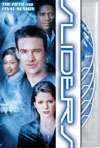
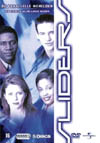
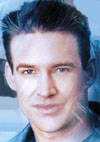

 A
A
